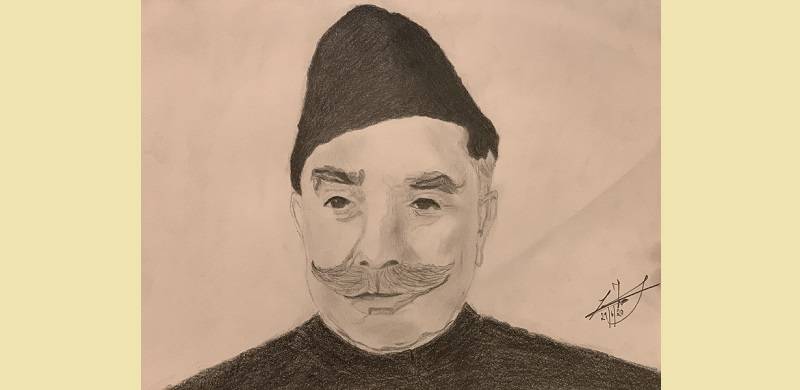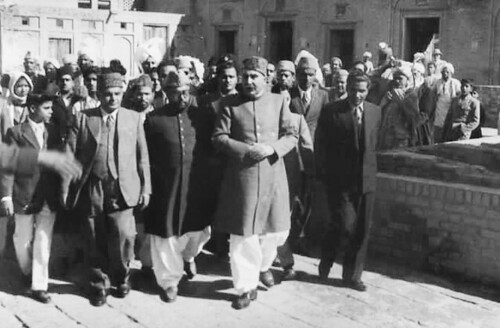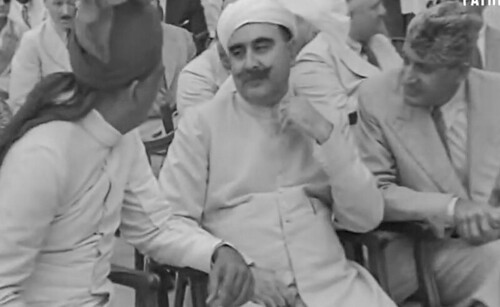
A car drives down a dusty road in Sargodha district and stops at a little village. From the car alights a tall, distinguished gentleman dressed in a sherwani and a Jinnah cap. He walks towards the modest homes and, upon espying an elderly woman outside a hut, he greets her with a salaam. The woman offers him a glass of lassi. The gentleman readily accepts and seats himself on a rickety old chair in the hut. The sole companion of our visitor is his armed guard, for whom a chair is obtained from the neighbor’s hut. Having finished the beverage, the visitor thanks his hostess and continues with his tour of the village. Amazingly, the gentleman in question is the Punjab governor and the period is a little over two years after the birth of Pakistan! Accustomed as we are to the elaborate displays of power, pomp and protocol by our presidents, prime ministers and governors et al, the conduct of this governor sounds unbelievably like a chapter out of the early days of the Islamic caliphate. But for those who know Sardar Abdul Rab Nishtar, the above anecdote will come as no surprise. February 14 marked the 64th death anniversary of this stalwart of the Muslim League, third only to Mohammed Ali Jinnah and Liaquat Ali Khan in the pantheon of leaders who struggled for Pakistan. Sadly, the day passed by without any noticeable official memorial ceremony or media attention. This is indeed a sad reflection of our collective lack of remembrance for one of the foremost founding fathers of Pakistan. I would like to narrate a few incidents from Nishtar’s personal and political life which highlight his integrity, uprightness of character and devotion to public service. This account may also be instructive for the younger generation since it would give them an inspiring perspective on a Pakistani politician, albeit from a bygone era.  On the 2nd August 1949, Nishtar had replaced Sir Francis Mudie as the first Pakistani Governor of the Punjab. This was a truly historic appointment because it was after 150 years of Sikh and British rule that a Muslim assumed the office, and that, too, in a free country. Ironically, the governor was not even a resident of the Punjab, rather he was a Pakhtun from the Kakar tribe, born and brought up in Peshawar. However, so honourably did he discharge his office that it is safe to say that Sardar Nishtar became the most beloved of the 30+ plus men who have served as Punjab’s governors in the last 74 years. The province was under Governor’s Rule when Nishtar took charge; and it remained so until the provincial assembly elections were held in March 1951. Therefore, for nearly two years, Nishtar exercised unfettered executive authority. Yet the hallmark of his governance was its simplicity and humility, as best evidenced by the above-mentioned Sargodha incident. Another simple proof of this fact was Nishtar’s attendance at congregational prayers at a different mosque each Friday, in order to use the occasion to enquire from a wide spectrum of people about the challenges facing them. He would not seat himself in the front row of the congregation, rather he would simply sit wherever he could find a slot! The late Yusuf Khattak, himself a leading freedom fighter, once stated that a senior leader of the Punjab Muslim League complained to Liaquat Ali Khan in the presence of Nishtar that as governor the latter had not supported the party’s election campaign. Nishtar responded by telling the complainant that he had taken an oath of neutrality as governor and he could not betray that oath by partiality towards a particular political party! Few succeeding governors in Pakistan have matched that gold standard of integrity. It is no secret that relations between Fatima Jinnah and Liaquat Ali Khan were seriously strained after the demise of the Quaid. However, this did not deter Nishtar from putting aside all protocol and arriving at Lahore’s railway station to personally receive his late leader’s sister, much to her surprise. It was only on the governor’s repeated insistence that she should consider him as Sardar Nishtar and not the Punjab governor that she accepted his request to stay at the Governor House. Most, if not all, governors would baulk at the prospect of earing their prime minister’s ire by playing host to someone not in his good books. But Nishtar was cut from a different cloth! In April 1953, Governor General Ghulam Mohammed dismissed the government of Prime Minister Khwaja Nazimuddin through a constitutional sleight of hand. All ministers of Nazimuddin’s cabinet, barring three, deserted their leader and promptly joined the new cabinet of Mohammed Ali Bogra. Of the remaining three, Fazlur Rehman and Abdus Sattar Pirzada were not invited to join the new cabinet. But only one minister, Sardar Nishtar, refused to barter his conscience at the altar of political expediency; he not only spurned the governor-general’s offer to join the cabinet but also declined to go overseas as an ambassador. Being an accomplished poet in Urdu and Persian, Nishtar described the governor-general’s unconstitutional move in the following memorable words: “Nairangi-e-siyasat-e-dauraan to dekhiye manzil mili unhein jo shareek-e-safar nah thay!” A little before his untimely demise at the age of 58, Nishtar was visited in hospital by Pir Syed Lal Badshah of Makhad. Having discovered from the duty doctor that Nishtar’s treatment was not at the optimum level because he was unable to afford some of the necessary medications, the stunned Pir slipped a few thousand rupees under the pillow of the patient while his attention was diverted elsewhere. Later, when Nishtar discovered the unsolicited gift, he immediately had the money returned to the Pir. Such was the honesty and self-respect of a man who had served as a federal minister for over four years and as Punjab governor for over two years! The outpouring of public love and affection for Nishtar was unprecedented, making his funeral in Karachi one of the largest ever in the history of Pakistan. Prime Minister Feroze Khan Noon at first declined to grant permission for Nishtar to be buried in the compound of the Quaid’s mausoleum, fearing it would set a wrong precedent. But he had to relent when Mohtarma Fatima Jinnah categorically indicated that Nishtar’s final repose must be in the precincts of her brother’s grave. This rare honour is shared by Nishtar with only three other souls, Fatima Jinnah herself, Liaquat Ali Khan and Nur-ul-Amin.
On the 2nd August 1949, Nishtar had replaced Sir Francis Mudie as the first Pakistani Governor of the Punjab. This was a truly historic appointment because it was after 150 years of Sikh and British rule that a Muslim assumed the office, and that, too, in a free country. Ironically, the governor was not even a resident of the Punjab, rather he was a Pakhtun from the Kakar tribe, born and brought up in Peshawar. However, so honourably did he discharge his office that it is safe to say that Sardar Nishtar became the most beloved of the 30+ plus men who have served as Punjab’s governors in the last 74 years. The province was under Governor’s Rule when Nishtar took charge; and it remained so until the provincial assembly elections were held in March 1951. Therefore, for nearly two years, Nishtar exercised unfettered executive authority. Yet the hallmark of his governance was its simplicity and humility, as best evidenced by the above-mentioned Sargodha incident. Another simple proof of this fact was Nishtar’s attendance at congregational prayers at a different mosque each Friday, in order to use the occasion to enquire from a wide spectrum of people about the challenges facing them. He would not seat himself in the front row of the congregation, rather he would simply sit wherever he could find a slot! The late Yusuf Khattak, himself a leading freedom fighter, once stated that a senior leader of the Punjab Muslim League complained to Liaquat Ali Khan in the presence of Nishtar that as governor the latter had not supported the party’s election campaign. Nishtar responded by telling the complainant that he had taken an oath of neutrality as governor and he could not betray that oath by partiality towards a particular political party! Few succeeding governors in Pakistan have matched that gold standard of integrity. It is no secret that relations between Fatima Jinnah and Liaquat Ali Khan were seriously strained after the demise of the Quaid. However, this did not deter Nishtar from putting aside all protocol and arriving at Lahore’s railway station to personally receive his late leader’s sister, much to her surprise. It was only on the governor’s repeated insistence that she should consider him as Sardar Nishtar and not the Punjab governor that she accepted his request to stay at the Governor House. Most, if not all, governors would baulk at the prospect of earing their prime minister’s ire by playing host to someone not in his good books. But Nishtar was cut from a different cloth! In April 1953, Governor General Ghulam Mohammed dismissed the government of Prime Minister Khwaja Nazimuddin through a constitutional sleight of hand. All ministers of Nazimuddin’s cabinet, barring three, deserted their leader and promptly joined the new cabinet of Mohammed Ali Bogra. Of the remaining three, Fazlur Rehman and Abdus Sattar Pirzada were not invited to join the new cabinet. But only one minister, Sardar Nishtar, refused to barter his conscience at the altar of political expediency; he not only spurned the governor-general’s offer to join the cabinet but also declined to go overseas as an ambassador. Being an accomplished poet in Urdu and Persian, Nishtar described the governor-general’s unconstitutional move in the following memorable words: “Nairangi-e-siyasat-e-dauraan to dekhiye manzil mili unhein jo shareek-e-safar nah thay!” A little before his untimely demise at the age of 58, Nishtar was visited in hospital by Pir Syed Lal Badshah of Makhad. Having discovered from the duty doctor that Nishtar’s treatment was not at the optimum level because he was unable to afford some of the necessary medications, the stunned Pir slipped a few thousand rupees under the pillow of the patient while his attention was diverted elsewhere. Later, when Nishtar discovered the unsolicited gift, he immediately had the money returned to the Pir. Such was the honesty and self-respect of a man who had served as a federal minister for over four years and as Punjab governor for over two years! The outpouring of public love and affection for Nishtar was unprecedented, making his funeral in Karachi one of the largest ever in the history of Pakistan. Prime Minister Feroze Khan Noon at first declined to grant permission for Nishtar to be buried in the compound of the Quaid’s mausoleum, fearing it would set a wrong precedent. But he had to relent when Mohtarma Fatima Jinnah categorically indicated that Nishtar’s final repose must be in the precincts of her brother’s grave. This rare honour is shared by Nishtar with only three other souls, Fatima Jinnah herself, Liaquat Ali Khan and Nur-ul-Amin. Epilogue: By September 1951, Liaquat Ali Khan had decided to make Nishtar deputy prime minister and his eventual successor. This appointment, and the removal of Ghulam Mohammed and Nawab Gurmani from their ministerial slots, was in all probability to have been announced at Rawalpindi on 16 October. However, the bullets fired by Said Akbar’s revolver on that day fatally changed the course of Pakistani history. A cabal primarily consisting of Ghulam Mohammed, Nawab Gurmani and Khwaja Shahabuddin successfully contrived to block Nishtar from succeeding Liaquat as prime minister. This was a grievous loss to the cause of a democratic and united Pakistan. The rest, as they say, is history!
Epilogue: By September 1951, Liaquat Ali Khan had decided to make Nishtar deputy prime minister and his eventual successor. This appointment, and the removal of Ghulam Mohammed and Nawab Gurmani from their ministerial slots, was in all probability to have been announced at Rawalpindi on 16 October. However, the bullets fired by Said Akbar’s revolver on that day fatally changed the course of Pakistani history. A cabal primarily consisting of Ghulam Mohammed, Nawab Gurmani and Khwaja Shahabuddin successfully contrived to block Nishtar from succeeding Liaquat as prime minister. This was a grievous loss to the cause of a democratic and united Pakistan. The rest, as they say, is history!

